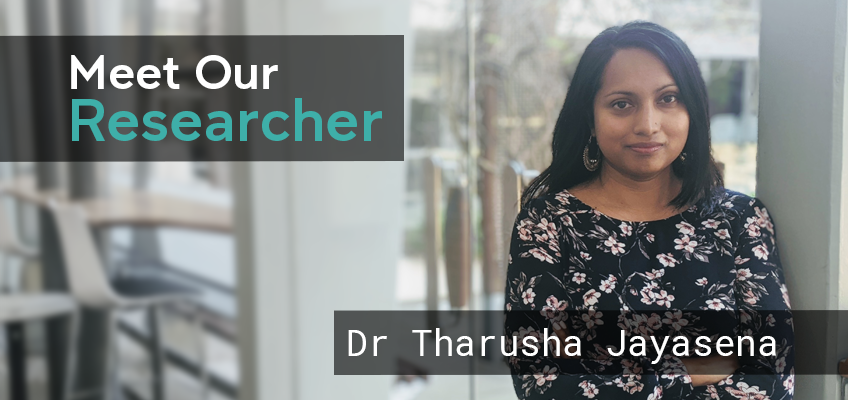10 Sep 2020

Diet is a key modifiable lifestyle factor to achieve healthier cognitive ageing. There is a wealth of evidence indicating the benefits of adopting a Mediterranean diet for improved brain health. Traditional Mediterranean diets have historically contained moderate amounts of fat, much of it from healthful monounsaturated fats (such as extra virgin olive oil and almonds), omega-3 fats (in foods like oily fish/seafood and walnuts), and polyunsaturated fats in other nuts and seeds. Levels of fatty acids found in blood have been reported to be altered in patients with mild cognitive impairment and Alzheimer’s disease, though outcomes are not always consistent, and subject numbers often small. Dr Tharusha Jayasena is investigating the effects of fatty acids on cognition, utilising one of CHeBA’s largest cohorts - the Sydney Memory and Ageing Study. The results will also be used by other groups to help address the gap in existing research on fatty acid levels and cognition.
How did you get into researching the ageing brain?
While I was undertaking my Bachelor of Science at UNSW, my favourite subject was pathology. In my final semester we were randomly assigned a topic as the main part of the assessment for the subject, and the topic assigned to me was “Unravelling the pathogenesis of Alzheimer’s disease”. I found this topic highly interesting and enjoyed researching the topic and consequently became fascinated by the disease. I achieved the top result in my class for the task which further motivated me toward researching the ageing brain and associated disease. As such, I decided to look for an honours year research project in the area of Alzheimer’s disease. I contacted Professor George Smythe; director of UNSW Medicine’s mass spectrometry facility at the time. My Honours project involved looking at the effect of metal chelators and antioxidants on oxidative damage to cultured neuronal cells and the implications for Alzheimer’s disease.
Did you experience a ‘defining moment’ which led you to this field?
My initial interest to pursue a career in science came from attending a UNSW open day as a high school student where we had the opportunity to explore the ‘Museum of Human Disease’.
I was mesmerised by all the specimens and it ignited an urge for me to understand the mechanisms of disease in the human body.
Later, during my Bachelor’s degree, I was drawn to the field of brain ageing and neurodegeneration when I achieved a high distinction for an article I wrote on the pathogenesis of Alzheimer’s disease. It felt the ageing brain and neurodegeneration was an area that I naturally had a passion to explore and pursue further in my career.

Do you have any personal interests or activities which are protective behaviours against cognitive decline?
One interest I have had ever since I was a child was a love of reading. I would take a book with me everywhere! In primary school I loved Nancy Drew detective books, in high school I loved anything by Jane Austen or Stephen King. I now enjoy more non-fiction books on topics which include Eastern philosophy and quantum physics. Another interest I have is practising meditation and yoga. I have done various meditation retreats and workshops and this year I completed a 200hr yoga teacher training certificate. Yoga and meditation provide me with both physical and mental health benefits. Finally, I am also conscious of my diet. I mostly maintain a pescatarian diet as I am aware of the benefits of fish and seafood for brain health and function. I love vegetarian and vegan food and consume very little meat. I also make sure I include lots of functional foods which are rich in polyphenols in my diet which have been shown to have protective effects, such as green tea, turmeric, berries, and bitter melon.
What are you currently researching?
I have just started a project looking at fatty acid levels in plasma using the Sydney Memory and Ageing Study. We are investigating the relationship between brain cognition and fatty acid levels and how this correlates with brain cognition and neurodegeneration. We will be looking at approximately 30 different fatty acids in the plasma and then investigating which ones may be most important or altered with brain cognition. My data will also be used by other research groups and consortia to complete a meta-analysis on fatty acids and chronic kidney disease. I have completed development of the method and am now completing analysis of the plasma samples.
Why is your research important?
By discovering the role that fatty acids may play in preventing cognitive decline we may validate the role of diet in maintaining healthy cognition throughout life and report modifiable dietary factors that may be key in preventing cognitive decline.
It is extremely important to have a large longitudinal cohort such as the one we are using at CHeBA to help elucidate the importance of fatty acids in ageing and neurodegeneration. It may also help us uncover potential plasma fatty acids as biomarkers for ageing and/or cognitive decline.
What do you love about working for CHeBA?
I really love having the opportunity to work with great mentors such as Professor Perminder Sachdev and Dr Anne Poljak who have been instrumental in guiding my research ideas and methods. The CHeBA environment is very conducive to collaboration and scientific pursuits as well as being open to discussing new ideas and directions for my research interests and projects.
What is the ultimate hope you have for your research?
My ultimate hope would be to see my research translated into clinical practice. If we can discover modifiable dietary factors such as fatty acids and also plant polyphenols, these may be able to be produced as supplements to be tested in transgenic animal models for Alzheimer’s disease and then possibly continue onto human clinical trials.
I would find it very rewarding if I could translate my research to the level of a pilot human clinical trial.
This interview was undertaken during the COVID-19 self-isolation period. Dr Tharusha Jayasena found that keeping in contact via phone, social media or skype calls with family and friends helped her to stay connected. Also, self-care activities such as listening to music, yoga, cooking and exercising at home also helped her maintain her mental wellbeing during these stressful times.
Donations are fundamental for critical research to continue following COVID-19.
If you would like to discuss supporting Dr Jayasena's work specifically, or would like information
on leaving a legacy via a Gift in your Will, please contact h.douglass@unsw.edu.au.

Dr Tharusha Jayasena is a Postdoctoral Fellow with both the Proteomics Group and Brain Ageing Research Laboratory at CHeBA. She obtained her PhD, MSc and BSc degrees at UNSW Sydney. Dr Jayasena is working on a project exploring the relationship between neurodegenerative disease and fatty acids in blood plasma utilising CHeBA’s Sydney Memory and Ageing Study.
